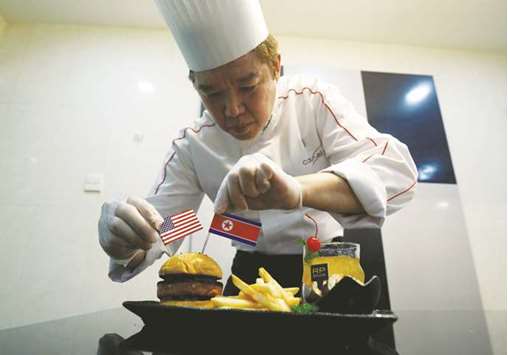Stella Choi, the principal of a Korean language school in a drab tower in downtown Singapore, works just across the elevator lobby from the modest suites that make up North Korea’s embassy.
Yet the South Korean national, who runs the iSpeak Korean Language Centre, says she has neither seen nor spoken to any of her Northern neighbours or people entering the embassy since they moved in two years ago.
Choi’s experience is consistent with the extremely low profile Singapore’s small community of North Koreans has kept in recent years as diplomatic pressure on their home country made travelling and working abroad increasingly difficult.
But they have disappeared in recent years as UN sanctions tightened around Pyongyang, and Singapore has been among the countries that have dutifully implemented resolutions to cut trade ties, ban transactions with North Korean banks and cancel the work passes of its citizens.
North Korea’s place in the world – and that of its diaspora – comes into focus in Singapore next week, when the city-state hosts the first ever summit between a sitting US president and a North Korean leader. Donald Trump and Kim Jong-un will discuss ending the North’s nuclear weapons and missile programmes in return for diplomatic and economic incentives.
Singapore, a global trading and financial hub, was once home to a close-knit group of a few dozen North Korean diplomats and businessmen responsible for channelling money, fuel and goods to the secretive state. While it still maintains diplomatic ties, North Korea’s embassy has moved from a three-storey property in a lively neighbourhood of heritage shop-houses to its present unassuming home.
“I hope to see them one day. Since the North and South Korean relationship is getting better, I may even be able to speak to them,” said Choi.
Reuters has visited the North Korean embassy multiple times over the last year but on all but one occasion there appeared to be nobody there. Reuters did once meet the embassy’s first secretary, Ri Pyong-dok, while he was entering the embassy in February 2017, but he declined comment.
In a call in recent weeks to the embassy to ask about preparations for the summit, a North Korean staffer also declined comment.
The Singapore foreign ministry has four North Korean officials and their spouses in its list of diplomatic and consular staff as of June 2018.
“The sanctions and the pressure that was put on by the US and its allies were definitely ... key motivating forces that encouraged him (Kim Jong-un) to consider engaging more, and to come out and have this summit,” said Nicholas Fang, director of security and global affairs at the Singapore Institute of International Affairs. North Korea has always strategically managed its expatriate population, mainly sending them to allies like China and Russia, where they feel they will not be corrupted by Western ideals.
Singapore is probably the most diplomatically neutral place where they’ve based people historically – more for trade reasons than diplomacy, said John Kim, a Korean-American businessman who advises a non-profit offering training in entrepreneurship and business in North Korea.
Kim said he had not spoken to a North Korean in Singapore in around five years. The last person John Kim spoke to told him there were around 50 North Koreans operating in the city-state, mainly in industries like shipping, although there are no official figures of the size of the community. In contrast, there are about 20,000 South Koreans living in Singapore.
In November, Singapore suspended all trade with North Korea to comply with tightening UN regulations. In March, Singapore said it had revoked the work permits of all remaining North Koreans in the country.
A long-time South Korean resident of Singapore who did not want to be named said until a few years ago, groups of North Koreans would come into South Korean-run restaurants for barbecue dinners and would sometimes strike up casual conversations with the South Korean patrons or staff. They would be relaxed and friendly, though there was occasionally tension in the banter, reflecting the rivalry between the two states, he said.
One more prominent North Korean figure in Singapore was Kim Jong-nam, the half brother of the current leader who was assassinated at Kuala Lumpur airport last year. A socialite, he often drank at a plush bar on the top of the iconic Marina Bay Sands hotel or in one of the city-state’s many karaoke joints, according to one of his friends, who declined to be named, citing safety reasons. The friend said Kim Jong-nam was down-to-earth, self-deprecating and open to jokes about his family connections.
“We would always ask, ‘So Kim, what do you think about communism?’ and he’s was always saying, ‘I’m all about peace and love.”

Chef Abraham Tan of Royal Plaza on Scotts’ Carousel restaurant puts finishing touches to his creation, the Trump Kim burger, in Singapore yesterday.
